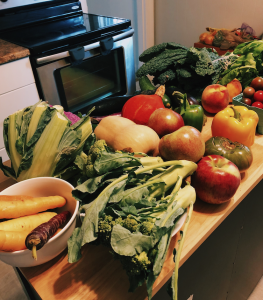Written by Ece Gulsan, Chemical Engineering Ph.D. student
After I finished high school, my parents sent me to Canada for an international cultural exchange program where I got to spend the whole summer in a small town called Guelph (near Toronto). I stayed with a host family, and became very close friends with their daughter Meagan. The next summer, she visited me in Istanbul, and we took her to our summer house which is located in Tenedos, one of the Greek-Turkish islands on the west coast of Turkey. My mom prepared a typical famous Turkish breakfastwith all the fresh produce she picked up from our garden, while my dad was spearfishing to catch some bluefish for dinner. When Meagan saw the table, she couldn’t hide her astonishment by how much we eat at breakfast. Then she grabbed a bite of a plump tomato, and amazedly murmured: “I didn’t know that real tomatoes actually taste like this!”.
Growing up in Turkey, I was very spoiled in terms of my food. Seasonal fruits and vegetables, fresh herbs, organic legumes, and assorted table wines were essentials of our pantry. Wild-caught fish was served at least three days a week with a drizzle of the highest quality extra-virgin olive oil. My family grew some of our own food, but we also had access to good quality fresh food at local markets.
Dealing with the differences in food culture was one of the biggest challenges I faced when moving to the U.S. for graduate school; not only the kind of food consumed, but also the way it is packaged and sold at supermarkets.
Graduate student life is very busy and demanding, and unhealthy habits can make our lives more difficult and stressful. Nourishing our bodies is as important as having a good night sleep and regular exercise. Understanding nutrition and healthy eating is more common these days, but for some people it can still be difficult to know where to start making changes to improve their health and feel better about what they eat.
Here is some basic information that will help you begin your journey towards a more balanced plate: avoid too much sugar and salt, read the list of ingredients on food packages, and try to learn more about the meanings behind terms like “gluten-free”—they don’t always mean “healthier.”
First of all, EAT YOUR VEGGIES! Here is an example of my weekly vegetable shopping from the farmer’s market.
In addition to all the minerals, vitamins, and phytochemicals necessary for your body to fully function, vegetables are also packed with fiber, which affect your overall health starting from your gut microbiome to all the way up to your cognitive abilities.
A great way to introduce more vegetables into your diet is to go seasonal—do some research online about what produce is in season for your location, or visit a local farmer’s market and see what’s available. Choosing fresh, local vegetables is also preferable to pre-cut, imported vegetables from the supermarket because pre-cut vegetables are more prone to bacteria and can lose their nutritional value when cut. Many packages also contain preservatives to keep them fresh; chlorine and ozone are sprayed on the vegetables to delay spoilage. Try to buy whole fruits and vegetables, and wash and cut them right before you will eat them; the difference in taste is impossible to ignore.
Another good way to get more healthy foods into your diet is to eat more high-quality proteins. Lean protein sources such as chicken breast have always been a “go-to” meal for me. However, considering how common the use of antibiotics in chicken farming is in the US, it could be a better idea to switch to turkey, which is a safer option in terms of additives. Turkey is also a great source of the amino acid called tryptophan, which is known to aid in quality sleep. Can you say no to a better night sleep as a graduate student? I thought so. If you don’t eat meat, you can add lentils and tofu to your diet for more protein.
When it comes to sleep quality, another thing you should be mindful about is the time at which you sip your coffee and how much you consume in a day. Coffee is the elixir of life for us graduate students, but it can take up to eight hours to be metabolized. So, if you go to sleep at 11:00 pm and want to wake up the day feeling well-rested, try to avoid drinking coffee after 3:00 pm, and aim to not exceed 400 mg of caffeine per day. It is also noteworthy that consuming coffee right after your meals significantly decreases the absorption of some minerals and vitamins in your food, such as iron.
Lastly, I would like to talk about meal-preps. I looooove meal-prepping! As a chemical engineer, I have this an obsession with knowing what exactly is in each of my meals. With a little preparation, you can bring your own food to campus and know that you have made something delicious and healthy (not to mention cost-efficient)!
 Health doesn’t just start and end with food. The containers you use to carry your food to campus can also be unhealthy. Many common plastic containers are a main source of “obesogens” called “endocrine disruptors,” and they tend to release into your food when they are in contact with fatty acids. Glass containers are a much safer option to avoid those chemicals. If you would like to learn more about how those chemicals affect our bodies and how serious they are, I recommend the Swedish documentary Submission (2010) by Stefan Jarl.
Health doesn’t just start and end with food. The containers you use to carry your food to campus can also be unhealthy. Many common plastic containers are a main source of “obesogens” called “endocrine disruptors,” and they tend to release into your food when they are in contact with fatty acids. Glass containers are a much safer option to avoid those chemicals. If you would like to learn more about how those chemicals affect our bodies and how serious they are, I recommend the Swedish documentary Submission (2010) by Stefan Jarl.
With a few simple changes, it is possible to eat healthier! Keep things balanced and stick to real food. You can also visit Tufts Sustainability and learn more about healthy eating on campus. With these tips, I hope you can take your healthy eating goals and upgrade them to a new level.


